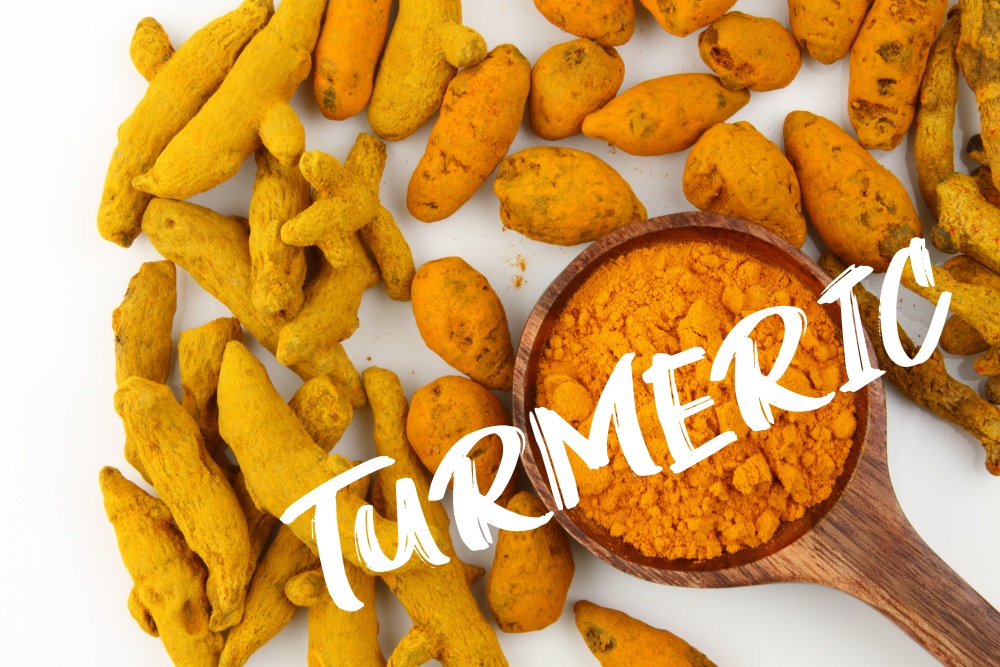There is a growing interest in people wanting to take control of their health and “longevity”. With this in mind, curiosity is growing surrounding the best “diet” for overall health and disease prevention. And of course, the jury is still out on whether or not there is a “perfect diet”. With that said, there is evidence that people who intake higher amounts of certain foods or spices, might have a small edge.
Turmeric, which starts out as curcumin, might have some health benefits. Therefore, in this article we will go through some of those potential health benefits and how to safely incorporate turmeric into your diet.
Types of Turmeric
Turmeric comes in many forms. Here’s a rundown of the most popular variants:
- Alleppey: 5% to 6.5% curcumin content
- Erode: 2.5% to 4.5% curcumin content
- Lakadong: 7% to 12% curcumin content
- Madras: Around 2% curcumin content
- Sangli: Up to 3.45% curcumin content
Health Benefits of Turmeric
The health benefits of turmeric or curcumin, the yellow pigment found in the spice, are a dime a dozen. Take a look at its top benefits:
Easing Depression
Low brain-derived neurotrophic factor (BDNF) is associated with depression.
If you have depression, taking curcumin could boost BDNF levels which has a small mount of evidence that this is linked to improved memory and learning. It may also increase the concentration of neurotransmitters like serotonin and dopamine, “happy hormones” that regulate mood, focus, and appetite.
According to a 2020 study, it inhibits the production of glutamate, in excitatory neurotransmitter, counteracting depression symptoms in a similar way as fluoxetine (Prozac) — an antidepressant.
Fighting Free Radicals
Curcumin can help prevent oxidative stress by eliminating different types of free radicals that cause cell damage and homeostatic disruption. It can also modulate the activity of glutathione peroxidase (GSH), and increase serum activities of other antioxidants, including superoxide dismutase (SOD) while battling oxidative stress.
Improving Memory
A 2018 research article showed the efficacy of a bioavailable form of curcumin on 40 subjects (ages 51–84). It showed improvements in learning, memory, and attention, likely brought on by a reduction in amyloid and tau accumulation in brain regions.
Improving Skin Health
Turmeric has anti-inflammatory, antibacterial, antifungal, and antimicrobial benefits. Hence, it may be beneficial for a variety of dermatologic diseases.
For example, a 2019 article showed its effectiveness in treating acne vulgaris. A gel infused with this spice has also been reported to improve the effects of photoaging. There’s also some evidence of oral curcumin being used for psoriasis, but further placebo-controlled studies are needed to support these findings.
Lowering the Risk of Heart Disease
Curcumin supplements can improve vascular endothelial function, which plays a significant role in regulating blood pressure and blood clotting.
Hence, it can be a promising nutraceutical in the prevention of cardiovascular diseases and reduce the risk of atherosclerosis development and progression. In fact, according to a 2012 study, it can even decrease the risk of heart attacks after coronary artery bypass grafting.
May Help Treat Rheumatoid Arthritis
Research in this area is limited, but a study conducted on humans reported curcumin could improve morning stiffness, walking time, and joint swelling.
Curcumin also has bone-protective mechanisms, making the plant beneficial in treating osteoporosis. This is backed by a pilot study that showed that the group who received curcumin had the highest percentage of improvement in overall Disease Activity Score (DAS) and American College of Rheumatology (ACR) scores.
Might Aid Cancer Prevention
Curcuminoids interfere with multiple cell signaling pathways, modulating cancer development and progression. A 2011 clinical trial reported a 40% reduction in aberrant crypt foci (ACF) in colorectal cancer that are believed to be precancerous lesions.
According to several studies, it can inhibit angiogenesis (growth of blood vessels that are associated with growth of cancer cells) and limit cancer cell metastasis, thereby reducing the risk of various malignant and benign cancers.
Preventing Eye Degeneration
Curcumin has neuroprotective properties so it can be an excellent therapy for the treatment of various eye diseases. This includes cataracts and glaucoma, eye conditions that damage the optic nerve and cause vision loss.
Treating Alzheimer’s
Turmeric can boost the levels of Brain-Derived Neurotrophic Factor (BDNF), a molecule that might have some association with the survival and growth of existing neurons.
As high levels of BDNF are associated with a lower risk of cognitive impairment, and curcumin can clear Abeta plaques — a neuropathological hallmark of Alzheimer’s, taking curcumin could lower the rate of cognitive decline in patients who have this disease. Of note, most of the evidence is in animal studies and report that further investigation is needed to confirm these findings
Treating or Preventing Diabetes
Curcumin can be used to prevent and treat diabetes, thanks to its positive effects on insulin resistance, hyperglycemia (high blood glucose), hyperlipidemia (high amounts of fatty substances in the blood), and islet apoptosis and necrosis.
However, most of these studies were conducted on animals, so its efficacy as a supplement should not be based on current research alone.
Uses of Turmeric: How To Consume This Ingredient
According to WHO, you need 1.4 mg of turmeric for every pound (0–3 mg per kg) of body weight, which should come to around one teaspoon a day.
There are many ways to incorporate it into your diet naturally, such as:
- Curry sauce
- Eggs
- Golden milk
- Grains
- Lentils
- Muffins
- Oatmeal
- Roasted veggies
- Scrambled eggs
- Smoothies
- Soups and stews
- Spice rubs or marinades
- Tea
Pro tip: Combine turmeric with black pepper. Black pepper contains “piperine,” which will improve the bioavailability of turmeric by 2,000%!
Turmeric as a Supplement
Curcumin has poor absorption, meaning not much of it reaches the body because compounds are broken down and eliminated quickly.
There is little evidence to support Turmeric supplements.
Conclusion
Turmeric can do wonders for your health, but it’s best to try and get your daily dose from food before turning to supplements.
Other Articles You Might Be Interested In:
Looking at the Bright Side: How Optimism Can Help You Live a Longer, Healthier Life
Are you a glass-half-full kind of person? If you are, then you’ll love what this article has to say about its impacts on health. If you struggle to look at the brighter side of things, this could be a sign that it’s time for a change. According to a clinical...
What You Should Know About Sensorineural Hearing Loss
Hearing loss affects millions of people around the globe. According to the World Health Organization (WHO), it is experienced by almost 20% of the entire population! There are three types of hearing loss, but more than 90% are attributed to sensorineural hearing loss....
A Beginner’s Guide to Tai Chi: Benefits & More
Tai chi, also known as shadow-boxing, is a mind-body exercise developed by the Chinese as a “soft” martial art in the 17th century. This low-impact workout involves slow, intentional movements and deep breaths to achieve a meditative state of mind. It makes you...
Understanding Food Cravings, Their Triggers, and How To Manage Them
We’ve all been beset by food cravings at some point in our lives, but most of us don’t really know where they come from or how to resist them. Since cravings are associated with higher body mass indexes, it has become more important than ever to understand the science...
Mindful Eating: The Moment-to-Moment Experience That Improves Your Quality of Life
Do you watch television or talk to a loved one over text while you eat? Time and again, cognitive science has proved that the human mind is incapable of performing two or more tasks at once. But, living in today’s modern, fast-paced world, we barely notice when we’re...
Want Healthy, Glowing Skin? Try Dry Brushing
Though dry brushing is a comparatively new trend in the skincare world, it has amassed an impressive 130.5 million views on TikTok under a hashtag by the same name. Gwyneth Paltrow and Miranda Kerr are fans of the beauty ritual which speaks of its popularity. As for...
Why You Should Laugh Your Way to Health
The quote, “Laughter is the best medicine,” has more truth to it than you realize. Humor skills or habits—having a propensity to laugh, the enjoyment of humor, the ability to laugh at oneself—are some of the main signature strengths one can possess. In fact, the...
12 Clever Ways To Healthy Eating on a Budget
Inflation and supply-chain disruptions have caused food prices to shoot up more quickly than in previous decades, making every trip to the grocery a costly and tricky affair. Despite the fact that food has become more expensive than ever, the federal minimum wage...
Volunteering: How Helping Others May Impact Overall Health
Volunteering is a pro-social behavior. It’s dedicating your time, attention, and resources toward helping people who are facing hardships in your community with no expectation of any reward or compensation. But there is something in it for you after all. Volunteering...
The Unseen Connection: Oral Health’s Surprising Impact on Heart Health
Did you know that the benefits of maintaining oral health go beyond your mouth? Oral health—the health of your teeth, gums, alveolar bone, etc.—plays a more significant role than you think. Sure, it keeps your gums and teeth clean and healthy. It also helps with basic...











